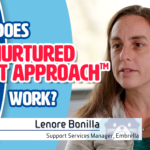“Why bother? Nothing will work out anyway. No one cares and it doesn’t make a difference.” These are sentiments shared by those plagued by the feeling of hopelessness. It’s not an uncommon emotion, and for many, it can be fleeting. However, for some foster children who have experienced unimaginable trauma and pain, hopelessness can linger.
Hopelessness is the feeling that nothing will ever be good or successful, that nothing will improve and there is no possibly way to fix it. It’s a “black hole” that, according to medical professionals, is related to depression and can strike anyone regardless of age, race or socioeconomic standing. According to the Centers for Disease Control and Prevention (CDC), about 9 percent of adult Americans have feelings of hopelessness and despondency that generate a diagnosis of depression.
As a foster parent, if you believe your foster child might be exhibiting signs of depression or hopelessness, it’s vital that you contact a medical professional. While this is a guide for what to look for, as well as ways to help, nothing here replaces a medical professional’s opinion.
According to “Hope in the Age of Anxiety,” written by psychology professors Anthony Scioli and Henry Biller, there are nine distinct types of hopelessness.
- Alienation – The belief that you are different, have been cut loose and are not worthy of love or support. For foster kids, alienation could stem from feeling different because they were removed or “cut loose” from their parents. Often alienated individuals tend to close themselves off because they are afraid of future rejection or hurt.
- Forsakenness – The belief that you have been abandoned at your time of greatest need. A foster teen could feel abandoned by his biological parents and left alone to the care of strangers.
- Uninspired – The belief that you cannot grow, create or transform. This is, according to Scioli and Biller, often difficult for members of underprivileged minorities who lack “opportunities for growth and positive role models.”
- Powerlessness – The belief that you are powerless to change or impact anything for the better. Foster children, who have been removed from their homes and told where they must stay, may feel powerless because they cannot control their situation.
- Oppression – The belief that you are being put down as a person or as part of a group. For a foster child who may feel different than his peers because he doesn’t live at home with his parents, he could believe he is being put down behind his back.
- Limitedness – The belief that you are deficient and lacking in the skills, personality and intelligence to be successful in the world.
- Doom – The belief that your life is over and that death is imminent. According to Scioli and Biller, the groups most “vulnerable to sinking into this particular circle of hell are those diagnosed with a serious, life-threatening illness.”
- Captivity – The belief that you cannot escape an abusive relationship.
- Helplessness – The belief that you can no longer safely live in the world because of trauma you previously have experienced. A foster child who has experienced trauma, such as watching a parent overdose on drugs or who has been physically abused, may feel that no matter where he goes, this sort of danger is always lurking. Therefore, he may feel helpless and unable to do anything.
Each type of hopelessness, according to Scioli and Biller, can be overcome by “restructuring of thoughts” and “accessing the right kind of hope-sustaining relationship.” However, in order to help him do this, it’s important to know what type of hopelessness your child might be suffering from.
As a foster parent, it’s extremely important that you be aware of the symptoms of hopelessness which include, but are not limited to, sadness, indecisiveness, extreme fatigue, irritability and a whole litany of other signs. If you believe your foster child may be exhibiting one or more of these symptoms, it’s crucial you involve a medical professional.
A medical professional is necessary to diagnose as well as determine the appropriate treatment for your foster child, but you, as a foster parent, can help through understanding and encouragement.
Is he feeling powerless because he’s been moved from home to home without any say? If that’s the case, as a foster parent you can empower him. Give him control of something – let him choose dinner for the week, give him the opportunity to set his schedule (i.e. whether he can do homework first before playing or vice versa).
The ability to make decisions, even small ones, can make a person feel like they are in control of their own destiny.
Maybe he’s feeling hopeless because he thinks he isn’t good enough, smart enough or strong enough to deserve love. For example, he may feel he’s the reason his mom couldn’t quit the drugs that destroyed his family. As a foster parent, you can combat this feeling of limitedness and instill confidence in him by offering encouraging words and supporting him whether it’s academically, athletically or personally.
It’s important to let him know that, no matter the situation, he is a worthwhile person who has unique qualities that are valuable to society. He matters, and it’s important you show him that on a daily basis.
Unfortunately, there is no one-size-fits-all cure for hopelessness. Each situation is different and requires a deft understanding of the complex issues at play. That’s why it’s vital if you or someone in your family –even a sibling—suspects your foster child may be suffering from hopelessness, you contact a medical professional. It’s equally important to let your children know that they should come to you if your foster child confides in them that he’s feeling hopeless. It takes a family to keep a family safe, and you should make sure all the children in your home understand they play a crucial part in that.
In the end, with a medical professional’s help and your newfound understanding, you can help fight hopelessness in your foster child.


